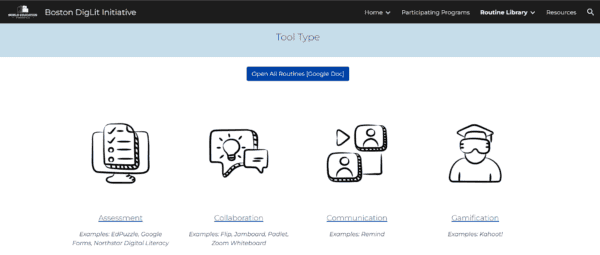
By Shirley Doan
This blog post is the third in the Digital Equity at World Education series, which recaps our recent and ongoing digital inclusion work at multiple levels. Read the preceding post, Centering Adult Learners in Digital Equity: A Digital Equity Act Retrospective, and check out our Digital Equity page to view all of our resources on digital equity and inclusion.
The COVID-19 pandemic spurred adult education providers across the country to re-evaluate their role in teaching digital skills. In late 2020, the City of Boston’s Office of Workforce Development conducted extensive interviews with local adult education and workforce development programs to identify the challenges the programs faced regarding integrating digital literacy. One year later, a follow-up survey highlighted the persistence of these challenges: of the programs that responded, 42 percent reported that their instruction still lacked a digital literacy component. The programs that did include digital literacy often viewed it as a distinct skill set or only provided digital literacy instruction on an ad hoc basis.
These findings led to the launch of the Boston Digital Literacy Initiative (DigLit), a partnership between the City of Boston and World Education, in 2022. The goal of DigLit was to strengthen the capacity of the 25 adult education programs in the Boston Adult Literacy Initiative (ALI) to integrate digital literacy and technology through a combination of coaching, technical assistance, and financial support over two years.

World Education provided program-focused, strengths-based coaching to each ALI program to identify opportunities to integrate technology and build staff and student digital skills. Each ALI program completed a needs assessment that addressed five areas:
- Technology integration practices for face-to-face and remote service delivery
- Staff digital literacy and technology integration skills
- Program practices that support staff digital literacy and technology integration
- Program practices that support students’ digital literacy skill development
- Technology infrastructure needs
Informed by the results of the needs assessments, the World Education coaches helped each program develop goals and a digital action plan that were aligned with the program’s strengths, assets, and short- and long-term needs. The digital needs assessment and action planning process confirmed that integrating digital literacy into adult education continued to be challenging for all programs, even as they improved their capacity to provide digital literacy instruction.
 In 2023, the City of Boston initiated a second phase of work to advance technology integration and digital literacy instruction. Drawing on World Education’s edtech routines model, which supports the regular utilization of effective, replicable routines (strategies) that integrate the use of educational technology in instruction while building learners’ digital skills, the City of Boston and World Education sought to spotlight and compile the digital literacy instructional strategies that programs were already doing. With program-based coaching and a community of practice led by World Education, as well as financial support from the City of Boston, participating ALI programs each drafted a set of edtech routines that World Education compiled into the Boston DigLit EdTech Strategy Routine Library. The edtech routines are organized into 14 categories, from learner assessment to web design, and are available for all ALI programs—and any adult education or workforce training program across the country—to use.
In 2023, the City of Boston initiated a second phase of work to advance technology integration and digital literacy instruction. Drawing on World Education’s edtech routines model, which supports the regular utilization of effective, replicable routines (strategies) that integrate the use of educational technology in instruction while building learners’ digital skills, the City of Boston and World Education sought to spotlight and compile the digital literacy instructional strategies that programs were already doing. With program-based coaching and a community of practice led by World Education, as well as financial support from the City of Boston, participating ALI programs each drafted a set of edtech routines that World Education compiled into the Boston DigLit EdTech Strategy Routine Library. The edtech routines are organized into 14 categories, from learner assessment to web design, and are available for all ALI programs—and any adult education or workforce training program across the country—to use.
The Boston Digital Literacy Initiative is a prime example of how cities can support their local providers in building the capacity to achieve evolving and critical goals. The 25 ALI programs collectively serve over 3000 Boston residents, and with the support of the City of Boston and World Education, they are now better equipped to provide residents with the digital literacy skills they need to advance in the workforce and beyond.
